怎一个Hot了得?
2018-03-12张蕊
张蕊


Words:424字 建议阅读时间:6分钟 难度:★★☆☆
【阅读理解】
1.How many meanings of“hot”are mentioned in the passage?
A.One. B.Two.
C.Three. D.Four.
2.What's the meaning of“dog days of summer”?
A.It refers to the days when the weather is so hot that dogs go wild.
B.It refers to the days on which Sirius rises at the same time as the sun.
C.It refers to the days on which the brightest star is in the summer sky.
D.It refers to the days on which people satisfy the dogs.
3.Which temperature can fry an egg on the sidewalk?
A.60℃. B.40℃.
C.30℃. D.20℃.
4.Who thinks the hottest place in the world is the hell?
A.The people in China.
B.The people in Europe.
C.The people who believe the hell exists.
D.The people on the earth.
5.Which“hot”in the following phrases has the same meaning in“a well-received song”?
A.Piping hot.
B.Hotter than a two-dollar pistol.
C.Fry an egg on a hot pan.
D.Hotter than the devil's underwear.
【答案解析】
1.C。细节理解题。文章前三段中的hot都是“热”的意思,在Hotter than a two-dollar pistol部分有“非法的”之意,文章最后一句中有“火辣的”之意,故选C。
2.B。细节理解题。第三段第三句:But in fact,the expression comes from 16th century astrology(占星术)and refers to the days on which Sirius—the Dog Star,the brightest star in the summer sky and part of the Great Dog constellation(星座)—rises at the same time as the sun.。句意:而事实上,该表达源于16世纪占星术,指的是夏季里,天空中最亮的大犬座天狼星同太阳同起落的日子。看refers to后面的宾语从句就是the days on which Sirius rises at the same time as the sun.,所以B正确。
3.A。推理判断题。倒数第二段的最后一句话:Even so,it is actually possible to fry an egg on the sidewalk,so long as you usea frying pan with a lid and the temperature is at least 49℃.。句意:即便如此,只要在温度不低于49℃的条件下,你用带盖煎锅就可以在人行道上“煎蛋”了。可以知道煎蛋的温度要在49℃以上,所以A正确。
4.C。细节理解题。最后一段的第一句话“For those who believe it exists,hell is undoubtedly the hottest place on earth,...对于些坚信地狱真实存在的人们而言,那里毫无疑问是世上最热的地方……”可知答案C。其他选项纯属“无中生有”型的干扰项。
5.D。词义推测题。题干中的well-received是“流行的”意思,和最后一句“...but more amusing variations have become popular,such as‘hotter than the devil's underwear.”有相同含义,故选D。句意:……而旧词新说令它们又“火”了一把,比如时下最潮的表达是“比魔鬼的内衣还要火辣”。
【词汇讲解】
1.piping hot 滚烫的 2.sweltering heat 酷热难耐
3.scorching sun 烈日炎炎 4.dog days of summer 三伏天
5.Hotter than a two-dollar pistol 炙手可热 6.Hinges of Hades 人间炼狱
【长句分析】
1.Apart from phrases like“piping hot”,“sweltering heat”and“scorching sun”,there are many interesting expressions that relate to unbearably hot weather and offer a glimpse into foreign culture.句意:除了像“piping hot”(滾烫的)、“sweltering heat”(酷热难耐)、“scorching sun”(烈日炎炎),英文中还有许多有关“酷热难耐”的有趣表达,从中我们也可以了解到一些外国文化。endprint
这是个复合句。主句是there are many interesting expressions,that引出了定语从句修饰expressions。其中relate to有下面几种含义:
(1)tell sth.to sb.向某人讲述某事
例如:The children enjoyed relating their imaginary adventures to the visitors.孩子们喜欢向来客讲述他们幻想中的冒险故事。
(2)understand and like sth.理解并且喜欢某物
例如:I can't relate to loud modern music.我不喜欢喧闹的现代音乐。
(3)have a friendly and sympathetic relationship with sb.与某人有友好和谐的关系
例如:This boss is best at relating to his employees.这位老板很善于和他的雇员们相处。
(4)be concerned with;be in relationship with关于;涉及;与……有关
例如:He sent me a letter relating to hisson's marriage.他给我来信讲了他儿子的婚事。
(5)connect by family与某人有亲戚关系
例如:Jim is related to Jack;Jack is his uncle.吉姆和杰克是亲戚,杰克是吉姆的叔叔。
2.“Hotter than the hinges(gates)of Hades”or“Hotter than the hobs(fireplaces)of Hell”are the oldest versions,but more amusing variations have become popular,such as“hotter than the devil's underwear”.“比地狱之门还热”或者“酷热胜于地狱的火炉”这些早已是祖母级的表达方式了,而旧词新说令它们又“火”了一把,比如时下最潮的表达是“比魔鬼的内衣还要火辣”。
这是but连接的两个并列句。连词but连接的是两个简单句。
amusing adj.有趣的,引人发笑的
adv.amusingly n.amusingness v.amuse
(1)The center of attention at a social gathering is peope who are amusing.聚会的灵魂人物在社交场合是人们注意的焦点的活跃的、有趣的人
(2)A newspaper cartoon is an amusing drawing,usually about some event in the news.报纸上的漫画是一种有趣的图画,通常是关于某一新闻事件的。
【语法点拨】
Many parts of China have also been struggling with record-breaking temperatures this hot summer.同样,中国大部分地区也在经受着史无前例的高温“烤”验。
句中的时态是现在完成进行时。现在完成进行时表示某动作从过去某个时间开始,一直延续到现在,并且还有可能持续下去。由“have/has been+现在分词”构成。所用的时间状语:this month/week/year,these days,recently/lately,in the past few+时间段,since+时间点,for+时间段。
例如:They have been building the bridge for two month.两个月来他们一直在修桥。
They have been planting trees this month.这个月来他们一直在植树。
现在完成进行时与现在完成时的区别:
(1)现在完成时强调动作的完成,而现在完成进行时强调动作的延续,因此,表示动作的完成,只能用现在完成时,而不能用现在完成进行时。例如:
He has changed his idea.他改变了想法。
(2)在表示动作的延续时,虽然既可用现在完成时,也可用现在完成進行时,但现在完成进行时强调动作的进行。因此在需要明确表示动作还要持续下去时,应用现在完成进行时。例如:
We have been studying here for two years.我们在这儿已经学习了两年了。
(3)有些延续性动词(如keep,learn,live, stay,study,work等),用于现在完成时或现在完成进行时的区别不大。例如:
I have lived here for many years.=I have been living here for many years.我在这儿住了多年了。
注意:短暂性动词不能和表一段时间的时间状语连用。如:come,go,arrive,reach,hear,close,leave,begin,start,lose,buy,fall,join,die,get up等。但如果要保留表一段时间的时间状语,必须将动词改为延续性动词。即由非延续性动词到延续性动词的转换。例如:
fall asleep(ill)→be asleep(ill)
get to know→know
begin(start)→be on
open→be open buy→have
get up→be up die→be dead
go out→be out come→be in
close→be closed arrive→be here
join→be in,be a+名词
finish(end)→be over
leave(move)→be away
borrow→keep
go to school→be a student
catch(a cold)→have(a cold)
begin to study→study
come back→be back
put on→wear或be onendprint
